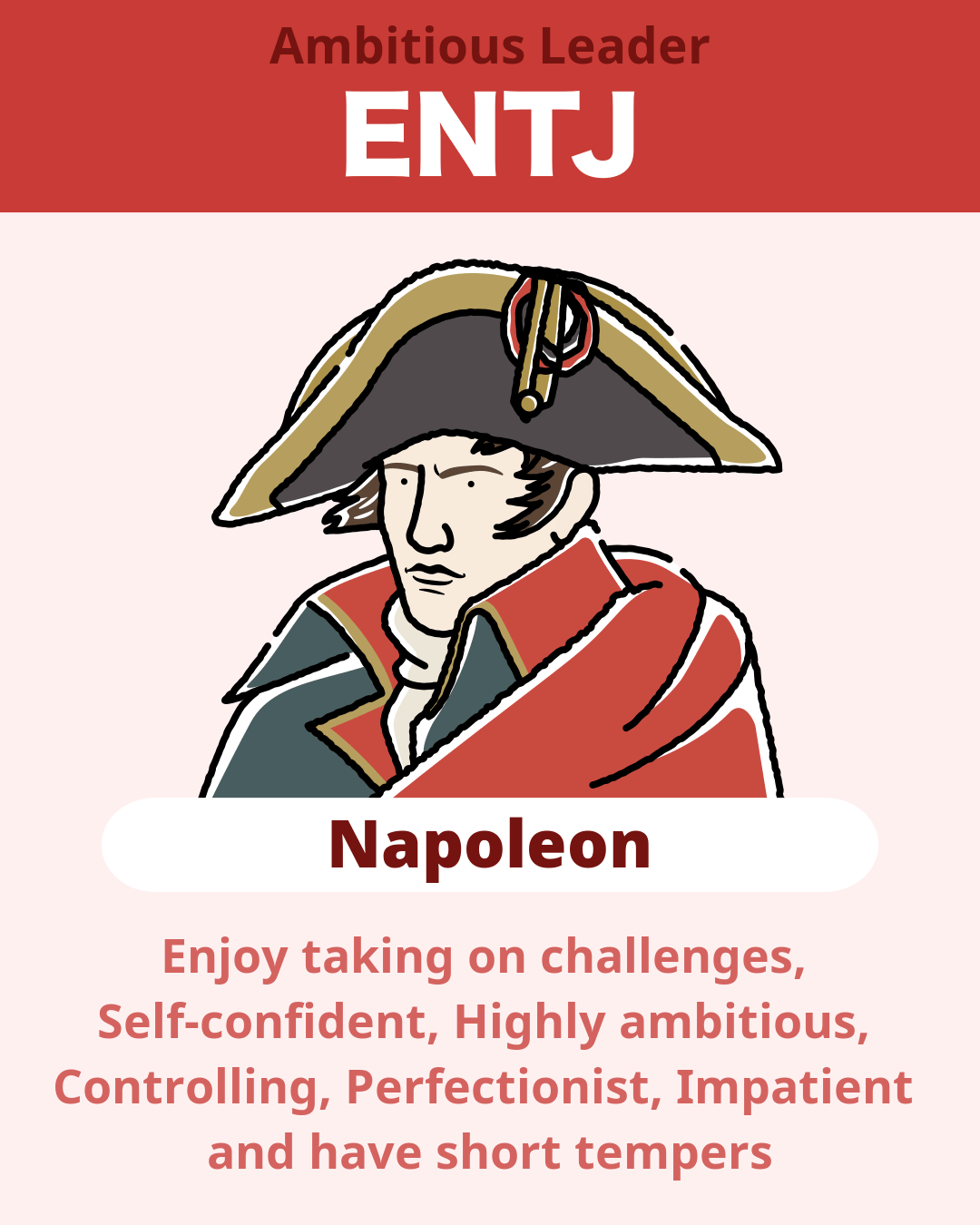
People with the ENTJ personality type, also known as the Commander personality type, are natural leaders with a strong ability to organize organizations, teams, and other groups. They are creative and good at transforming ideas into long-term plans and implementing them. Once they have set a lofty goal, they will create strategies and push hard to achieve said goal. Because of their self-confidence and bravado, they are frequently perceived as arrogant or dictatorial. However, they actually emphasize fairness and reasonableness, and readily accept things that make sense to them. ENTJs like thinking strategically, and they solve challenges by considering the challenge logically and from multiple perspectives. On the other hand, they are not good at dealing with arguments based on emotion, and they convey their opinions frankly and clearly, sometimes to the point of hurting others' feelings.





| Ranks | Types | % | |
|---|---|---|---|
| 1 | INFP | Vincent van Gogh | 13% |
| 2 | ENFP | Anne Frank | 11% |
| 3 | ISFP | Mozart | 8% |
| 4 | INTP | Albert Einstein | 8% |
| 5 | INFJ | Nightingale | 8% |
| 6 | ESFJ | Andrew Carnegie | 7% |
| 7 | ISFJ | Mother Teresa | 7% |
| 8 | ESFP | Marie Antoinette | 6% |
| 9 | ENTP | Thomas Edison | 6% |
| 10 | ENFJ | Joan of Arc | 5% |
| 11 | ISTJ | Sigmund Freud | 4% |
| 12 | ISTP | Spartacus | 4% |
| 13 | INTJ | Leonardo da Vinci | 4% |
| 14 | ESTJ | George Washington | 3% |
| 15 | ESTP | Columbus | 3% |
| 16 | ENTJ | Napoleon★ | 3% |
The Myers-Briggs Type Indicator is a well-known way to determine what kind of person someone is. The test asks the participants about their habits and preferences and then sorts them into groups based on their key functions and attitudes. The MBTI says there are 16 basic types of people, and acronyms like ENTJ are used to describe them.
Carl Jung, a psychologist, thought consciousness shows itself through non rational functions, rational functions, and attitude types. This is where the Myers-Briggs personality types come from. Everyone possesses a dominant function and attitude that they're most comfortable with and use most of the time and a repressed or unconscious contrary function that they rarely use or show.
In simplest terms, the strengths and weaknesses of various personalities come from this mix of dominant functions, attitudes, and repressed functions. Jung's original theories about personality types were more complicated than those used today. The 4-letter system created by Myers and Briggs is currently utilized in many different personality theories.
The "E" in ENTJ stands for "extrovert," which shows that you prefer to focus your mind and get your energy from other people. Extroverts are driven and energized by doing things with others, attending group events, and being in a crowd. They like to be active, have fun, and have many friends and acquaintances. Most of the time, they understand the situation better when they talk about them with other people, and they often act before they think.
The N in ENFP remains for iNtuition, which shows what information you find most important and easy to remember. People who are intuitive pay attention to mental images and thought patterns and are good at working with theories, symbols, and abstractions.
ENTJs have an open mind and don't take it personally when someone disagrees with or criticizes them. Intuitive people study by thinking things through and imagining how things could go. The future and possibilities are more important to them than the specifics of the here and nowadays.
The "T" stands for "thinking," which shows how you like to make decisions. The thinking personality type likes to make decisions based on general rules and facts rather than their own or other people's feelings. Instead, they try to look at the pros and cons logically and objectively and develop decisions and rules that make sense and can be used in many different situations.
The J in stands for "judging," which shows how you act in public and want others to see you. A person with a judging personality type thinks first, so everything in their life seems planned and in order. They make clear and consistent decisions, stay organized and on schedule, and like to make plans and lists ahead of time.
With all of these qualities, the ENTJ has earned the nickname "The Commander" because they are good at being analytical, thinking strategically, and talking to people in a way that makes them want to listen. They notice flaws and problems quickly and like to find and use ways to make things better.
Also, they are decisive and enjoy making final decisions, making them great managers who can use their skills to get other people working toward the same goals. The ENTJ personality type is the rarest, with only 2-5% of the population and 1-4% of women having it. However, their natural leadership skills make them stand out. ENTJs make up a lot of our most well-known politicians and business owners.
The ENTJ is confident in its ability to look at problems and situations, determine what's going on, and make the right choice. So, they believe in their skills, say what they think without compromising or second-guessing themselves, and are willing to work hard and take chances based on their thoughts.
An ENTJ doesn't want anything to get in the way of putting their plans and ideas into action, so they naturally improve the organization and cut down on waste. They are very good at streamlining processes and can organize people and systems just as well as they can organize themselves.
An ENTJ doesn't want to waste time worrying and not doing anything. They make clear decisions and act and explain people well to others. Once they choose, they stick to it and don't change their minds.
The ENTJ is a great communicator who can explain to others how they think and why. This makes them very convincing since other people understand how they think and why they make their own decisions. As a result, they agree with their choices and try to make them happen.
Some people might be scared off by an ENTJ's confidence and assertiveness, but they are open to criticism and disagreement and don't bring it personally. If you give ENTJ new data, start creating valid criticisms, or show them they are bad, they will quickly adapt to the new position and act in a method that makes sense without getting angry or resentful. They might even like and respect you for it.
Most of the ENTJ's flaws are probably already clear because they are part of what makes them strong. Here are the biggest problems with ENTJ:
The ENTJ is known for not being able to wait. This can make them ignore useful information if it comes too slowly or get angry at slow and inefficient systems and processes. Also, their impatience can cause others to feel like they don't have time to explain themselves, give their opinions, or fully participate.
Even though an ENTJ is open to new ideas and points of view, they won't change their minds unless they are shown to be wrong. Their confidence and determination often make them stubborn and unwilling to change. They won't listen to ideas that would slow or remove them from their plans and goals. Either way, they won't give in to small problems just to get along and keep the peace.
An ENTJ is a direct communicator who is often blunt, cold, and insensitive. They are not emotional and only talk about facts. They don't take care of their feelings or other people's feelings; when they're upset, they often shut down or get angry.
When confidence, determination, and a lack of empathy come together, the ENTJ can be aggressive and even cruel. When they get past a problem, ignore an objection, put a plan into action, or reach a goal, they won't let anything stop them.
When you look at the lives of famous ENTJs such as Steve Jobs and Margaret Thatcher, it's easy to see how this mix of strengths and weaknesses works. The Commander is a natural leader with a high IQ, strategic talent, and the ability to talk to people and convince them to follow their plans.
People can feel like they don't have the opportunity to clarify themselves, give their opinions, or fully take part when they are impatient. As leaders, many people like how honest and open they are with each other and how willing they are to take in new information and change.
But it can be hard to work for them because they are impatient, rude, and insensitive. People at work often think ENTJs are ambitious and want to advance to become leaders. But the ENTJ isn't motivated by titles or money; they just want the freedom to carry out their plans without being stopped.
When an ENTJ isn't in a leadership role, they can be hard to manage and monitor because they often disagree and criticize directly. Because of these things, ENTJs must choose careers that match their strengths and avoid things that make them unhappy.
ENTJs tend to avoid jobs like childcare and nursing and work inside the service industry that requires a lot of emotional communication, compassion, and compromise.
As you might have guessed, ENTJs are also great entrepreneurs who make more money than anyone else when they work for themselves. Because ENTJs are so sure of themselves, they might not think about how they could improve themselves. Still, they will be happier if they try to find a better balance, focusing less on work and more on other things.
The ENTJ needs to develop an appreciation for feelings and passions, both their own and those of others, to grow and find more balance. They can do this because they use their skills to reach other goals, working hard and paying. Some ways to deal with ENTJ's weaknesses are:
Mindfulness can help ENTJ overcome their impatience, which often makes them rude and upsetting to others. Take some time for mindful listening. Instead of rushing to decide on something and act on it, an ENTJ should try to sit quietly with a problem and think about it. If you find a point of view that makes you feel bad, think about it for a while and try to figure out why you feel that way.
The ENTJ can focus on their feelings and slow down by writing in a journal, but they mustn't give in to their natural urge to make lists. For example, an ENTJ could pick one emotion daily and talk about when they felt it and how it felt in every area of their body. Instead of concentrating on extroverted thinking, it's good for the ENTJ to explore their physical and emotional side introvertedly.
The ENTJ is an unusual personality type, but it's easy to spot because they are active and dominant. Even though the commanders' personalities aren't very big, the unusual mix of their traits makes them memorable and has greatly impacted business, politics, and history. The INTJ's similar but less noticeable sister personality type is just as rare and influential.